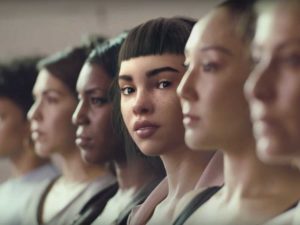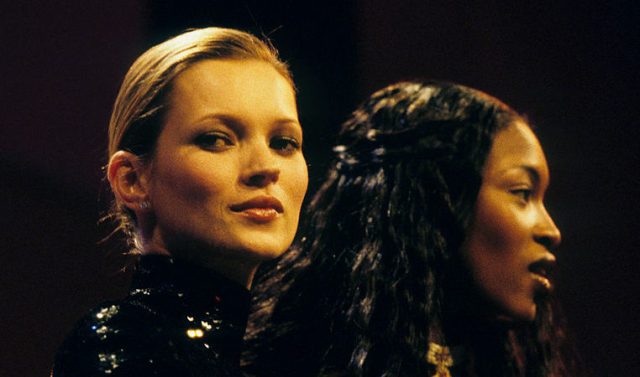CGI models can’t represent an era like Kate Moss or Naomi Campbell. Credit: Ke.Mazur/WireImage

I used to be quite dubious about whether modelling even counted as a job. It’s just wearing clothes while being beautiful and thin: how hard can that be? Then I had a job that meant I sometimes had to go on fashion shoots. Nothing terribly glamorous: I was working on a knitting magazine, so my duties involved trudging around drizzly parks toting carrier bags full of “technically interesting” garments (the kind of things people would want to make, rather than necessarily wear) for our model of the month to pose in.
And wow, they could turn it on, selling that cabled jerkin with a dazzling smile and an elegant pose in the deeply undazzling, inelegant environs of a Bishops Stortford business park. I wondered whether they knew this was their reward for surviving the scrutiny of me and my colleagues in the office (“not sure about her nose”, “bit tacky looking”, “too booby”). I wondered whether I’d be able to lend quite the same chic to a sweater if I thought people were saying those things about me. That was when I had to accept that modelling is proper work.
But it isn’t going to be work for much longer, thanks to the rise of CGI models, who are nearly indistinguishable from the real thing and undeniably superior in many ways. It’s taken a few years, but finally the fashion industry has found a way to get women out the picture altogether. Not, of course, that the fashion industry doesn’t rely on women — it needs us to buy stuff — but women do have the unfortunate habit of messing up photographs of beautiful things with their icky fleshy bodies.
Real women have dimpled thighs that need smoothing in post-production, unruly hair that needs tidying, blemishes that need editing. On shoots, they get tired and cold and they need the toilet and sometimes the clothes just won’t fit their inconvenient frames. How much more efficient to call up an agency like Brud, which specialises in producing virtual supermodels, and have your product displayed on one of their eerily plausible creations instead.
Brands including Fenty, Balmain and Swarovski have gone the CGI route, working with CGI creations such as Miquela Sousa and Shudu Gram. And Brud doesn’t stop at producing pretty faces: copywriters devise personas to match the looks, and the virtual models’ Instagram accounts have followers in the millions, commanding sponsorship fees to match. Their fakeness isn’t concealed, it’s celebrated — although the ubiquitousness of image processing means that the line between reality and unreality is surprisingly easy to drift over. The uncanny valley has been filled in.

Beauty has always involved artifice. Behind every perfect editorial look, there’s a hairdresser, a nutritionist, a personal trainer, an aesthetician, a make-up artist, an eyelash technician — all working to turn that woman into something worth looking at. Then there’s the stylist and the photographer, and after that the tweaks. But tweaking isn’t the preserve of glossy magazines any more: it’s built into your Zoom settings and your selfie defaults. Even those #nofilter pictures you see on the ’gram are the products of thousands of tiny digital decisions, none of which is going to have been programmed to make you look worse.
So virtual models are in a way nothing but a natural escalation, and they’re especially alluring in the Covid-era, given that the pandemic makes conventional shoots seem less like dream factories, more like superspreader events. The scope for them to muscle out humans in the “new normal” is obvious. If an online shop needs several thousand pictures to show off several thousand garments, why wouldn’t they skip the casting headache and the faff of the shoots, and use the digital option instead? If consumers don’t mind (and on the whole they don’t seem to), the only objections are likely to come from the human models losing out on work.
I will miss them, though. Seeing a model really bring it is in the same category of wonder as watching an actor pull off a bravura performance or a gymnast nail a routine. At its best, modelling isn’t just a job, it’s era-defining art — if you love fashion, there’s a thrill in seeing how a Twiggy or a Campbell or a Moss can bring a different part of herself to different photographers on different shoots, a pleasure in the interaction between the images they make and their off-page celebrity. A really great model is the embodiment of her time.
Miquela and Shudu can’t personify a decade in the same way, because they stand outside of time. They’re not actually people. Then again, this is another thing to recommend them to corporations, given that models’ personalities can be more trouble than they’re worth: plenty of influencers have talked themselves out of a contract with a spicy opinion. Brand managers can sleep tight every night knowing that their virtual representatives aren’t going to have an inconvenient meltdown or start sharing — God forbid — her political views. Digital models are a caution for any woman who might throw around her own untidy thoughts.
And maybe it’s better that fake women take the brunt of modelling, when modelling itself — however much I like to romanticise it — is a grim old business. Bishops Stortford isn’t the half of it. It’s an industry where male photographers and agents have much of the power, and girls are the product. Predation is guaranteed. For years, the photographer Terry Richardson practised an overexposed irony-sleaze aesthetic that was the perfect cover for his real-sleaze habit of sexually assaulting models. Allegations dating back to 2010 went ignored because he had the blessed quality of hotness (he took Obama’s portrait), and only in 2017 was he finally disgraced enough to become a liability.
It’s not enough to see Richardson as one bad actor. It took an entire industry to turn a blind eye and go on serving up girls to him. The same industry, in fact, that allowed Elite Models boss Gérald Marie to allegedly run his agency as a trafficking ring, shipping young women wherever they were wanted and securing their compliance with promises about what he could do for their careers. It’s hard to feel huge regret for the demise of a job that’s been associated with so much abuse.
Still, replacing real models with virtual ones is only a solution in the same way that you can “solve” your woodworm by burning down your house: yes, you’ve eliminated the exploitation of women, but you’ve done it by eliminating women. And that causes another, bigger problem.
It’s bruising enough to compare yourself to the deftly touched-up living representatives of beauty — so bruising, in fact, that an alternate ecosystem of imperfect influencers has emerged. Women who are willing to celebrate their fat, their stretch marks or their acne can win big social media followings with an audience that is relieved to simply not feel freakish for once, although alternative beauty standards are still beauty standards. Hence Cosmopolitan’s “This is healthy!” New Year covers, starring models who are fat but still able to do the dancer’s yoga pose (although it’s unclear why being overweight and bendy is any healthier than being standard-model underweight and bendy).
When CGI models eliminate even the tiny human happenstance allowed to models now, they also remove the last remnants of sympathy that a woman might afford herself. Judging yourself by the standard of a hipless teenager is one level of cruelty; judging yourself against what is, effectively, a drawing of a hipless teenager is a whole step beyond. Models tell us what society has decided perfection is. It’s a shifting standard, and those shifts say something about society’s desires.
The Sixties looked for youth and informality, the Eighties sought statuesque glamour, the Nineties wanted women who looked fragile and waifish. And the Twenties want women who don’t exist. It’s of a piece with a world that would write women out of reproduction through surrogacy, out of politics by declaring them not really a group, and out of language altogether by reducing the word to representing, at best, an “identity” rather than a sex. The ultimate in femininity in 2021 is to be nothing at all.










Join the discussion
Join like minded readers that support our journalism by becoming a paid subscriber
To join the discussion in the comments, become a paid subscriber.
Join like minded readers that support our journalism, read unlimited articles and enjoy other subscriber-only benefits.
Subscribe